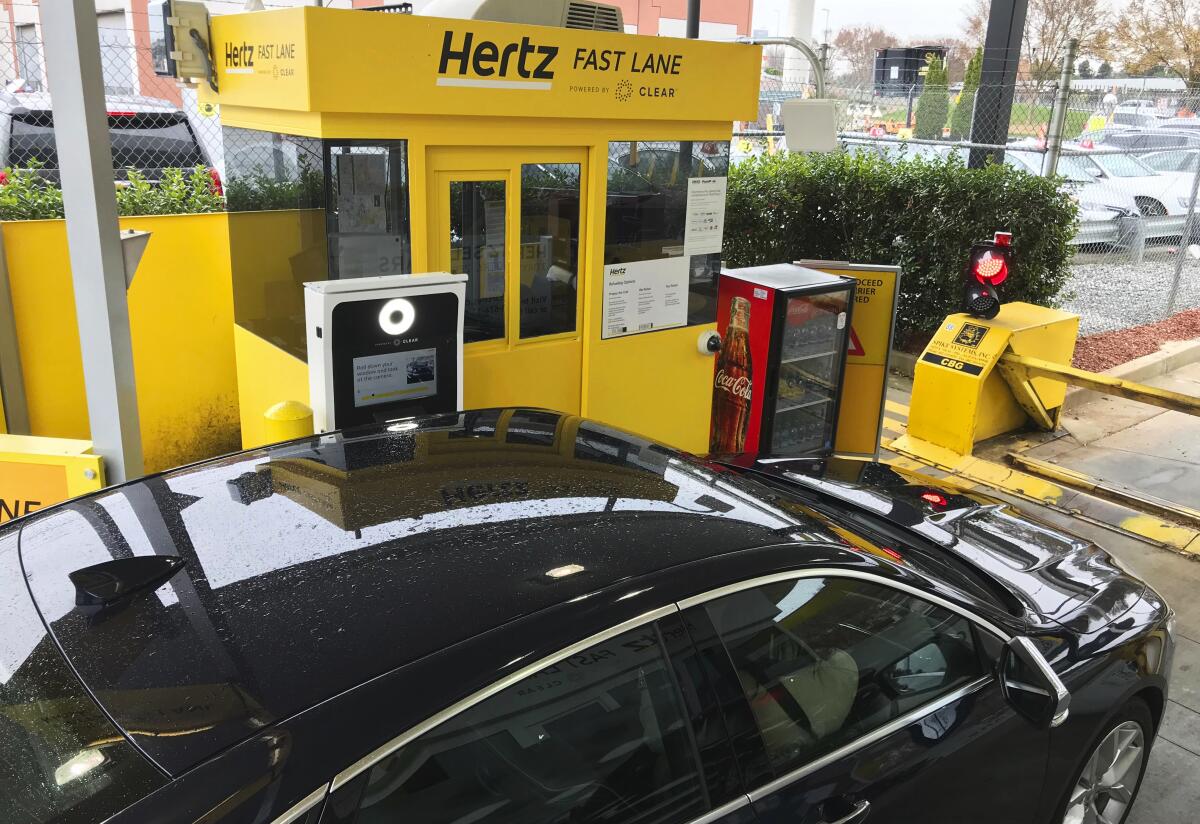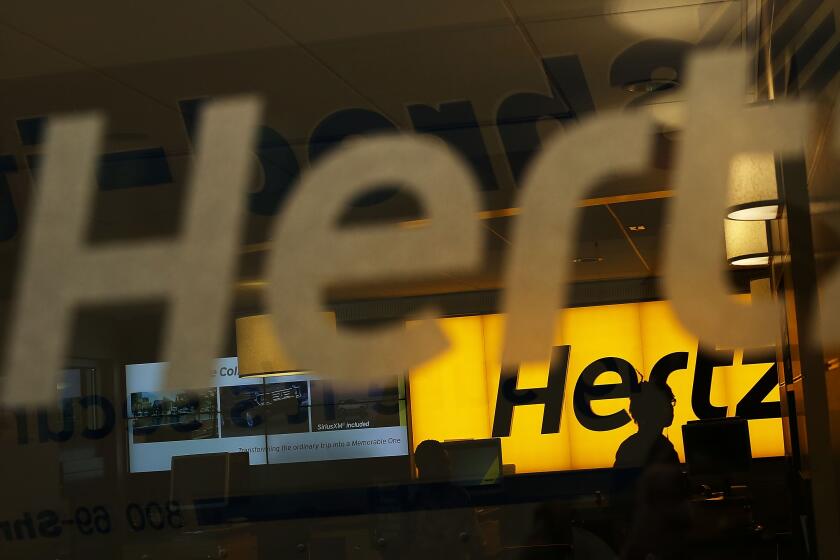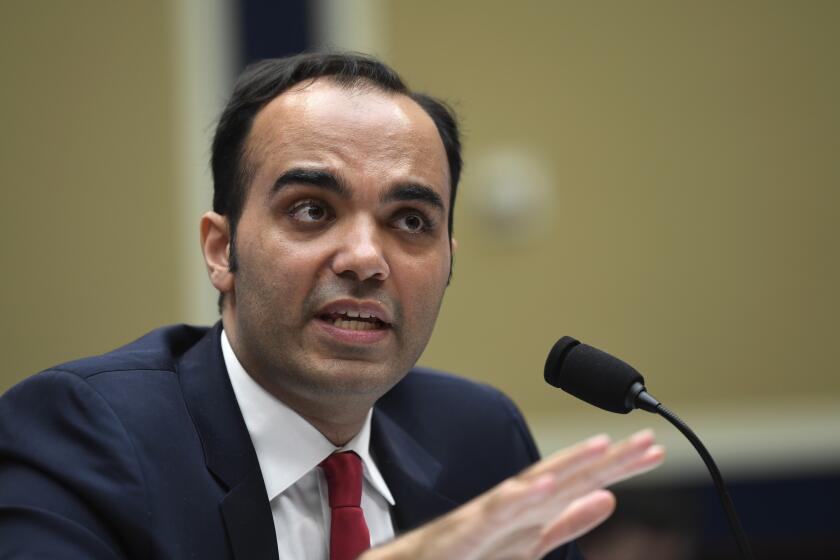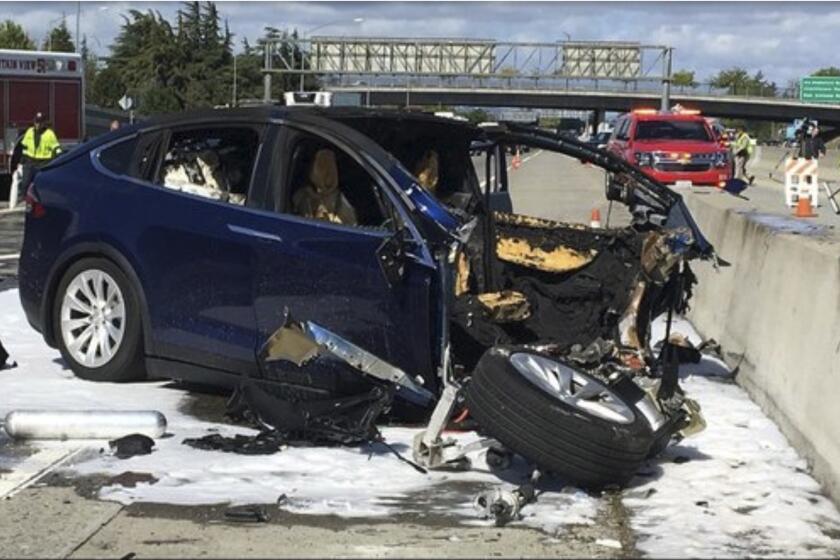Column: Renting a car from Hertz? You could wind up in jail

Tederhi Usude, a Santa Clarita dentist, rented a car from Hertz in June 2020 to drive to a job at a nonprofit health clinic in rural Mendocino County. He extended the rental several times with Hertz’s permission and paid a total of $7,000.
Usude, 55, says that in his last conversation with a Hertz agent he explained that he was temporarily quarantined because of a COVID-19 outbreak at the clinic, and would return the car as soon as he was cleared to travel again. On Dec. 18, 2020, he was on his way to return the vehicle the week before Christmas — in fact, he had turned onto the very street where the Hertz office was located.
That’s when his nightmare began. A police car flashed its lights behind him. He pulled over and was ordered out of the car. By then six or eight squad cars were on the scene. He was told to lie on the ground, was handcuffed and was taken to jail, where he spent the night.
Whether or not Hertz knew how bad this problem is when the new owners bought it, they know about it now.
— Plaintiffs’ lawyer Francis Malofiy
According to a declaration Usude filed in court, an officer informed him that Hertz had reported him for theft and “embezzlement.”
When he showed the officer his rental agreement and an invoice on his cellphone showing that Hertz had billed his debit card $3,973.45 just two days earlier, he recalls, the officer told him, “There’s nothing I can do,” because Hertz had reported the car stolen.
Get the latest from Michael Hiltzik
Commentary on economics and more from a Pulitzer Prize winner.
You may occasionally receive promotional content from the Los Angeles Times.
Since that day, Usude has waited to learn whether his theft case will ever be prosecuted. No court date has been set.
Usude is in the same boat as some 230 other Hertz customers who say they were falsely arrested based on groundless company theft reports. Some faced prosecution for felonies and spent days or weeks in jail, even though they had returned their rented cars to Hertz and paid their bills. Their damage claims come to a total of $690 million.
They’ve asked a bankruptcy judge in Delaware to add them to the roster of creditors in Hertz’s 2019 bankruptcy case. Even though the rental company emerged from bankruptcy last year, the judge is still considering the customers’ claims because of doubts about whether the company properly informed them of the procedures to be named as creditors.
Hertz is a one-stop shop for American corporate shortcomings.
Their experiences may be the tip of a large iceberg. Hertz acknowledges that it files some 3,500 theft reports per year on customers; lawyers for the claimants say that figure applies to customers who rented their vehicles legally and for which the company has payment information, such as a credit or debit card number, on file.
Lawyers for the claimants say that although it’s not unheard of for other car rental companies to report vehicles stolen, Hertz appears to have systemic problems keeping track of rental extensions and payments.
They say that when the errors in the theft reports are documented, Hertz refuses to withdraw the reports and advises the customers to “address this matter through the legal system.”
It’s possible that some of Hertz’s problems with record-keeping and other elements of its theft reporting stem from the chaos the company has gone through in recent years, culminating in the 2019 bankruptcy.
As I reported in December, the troubles began in 2012, when the company paid an obviously inflated $2.3 billion for the Dollar and Thrifty rental chain. By 2017, Hertz was in the red. Its stock market valuation fell from $5.5 billion before the Dollar/Thrifty acquisition to $1 billion by May 2017.
Hertz lost a total of $273 million in 2018 and 2019 while its debt soared. That weakened its ability to withstand the travel slump during the pandemic; in 2020 its loss ballooned to $1.86 billion.
Hertz also had to restate its earnings from February 2012 through March 2014 to correct what the Securities and Exchange Commission said were material misstatements, and it paid a $16-million penalty in 2019 to settle the SEC complaint.
In May a group chiefly comprising two private equity firms, Knighthead Capital Management and Certares Management, brought the company out of bankruptcy. Among the problems they inherited were the claims from customers alleging they were improperly accused of auto theft.
A proposed model law could rein in some of corporate America’s bad behavior toward consumers.
A Hertz spokesman told me that “situations where vehicles are reported to the authorities are very rare and happen only after exhaustive attempts to reach the customer.” The spokesman, Gary Koops, shifted the blame to the customers: “The vast majority of these cases involve renters who were many weeks or even months overdue returning vehicles and who stopped communicating with us well beyond the scheduled due date,” he said.
There are no indications that the company’s management is addressing the issue seriously; its approach in Bankruptcy Court has included arguing that the customers should be barred from collecting damages because they failed to identify themselves as creditors during the bankruptcy.
The claimants’ lawyers contend, however, that Hertz knew the identities of most of the customers when it filed its bankruptcy petition and should have informed them of their filing deadline.
“Nothing has been done to curtail this behavior or to stop it,” says Francis Malofiy, a Pennsylvania lawyer who represents many of the customers. “Whether or not Hertz knew how bad this problem is when the new owners bought it, they know about it now.”
These cases cast another shadow over Hertz, which risks becoming synonymous with atrocious customer service for other reasons. They’re also an embarrassment for Hertz Chairman Greg O’Hara, a founder of Certares, who serves on the board of the Innocence Project, a nonprofit devoted to exonerating innocent people caught in the web of the justice system. The Innocence Project did not respond to my request for comment.
The 3,500 theft reports, Koops says, amount to a mere 0.014% of the more than 25 million rentals a year at Hertz. That may sound like the old air industry beef about how reports on plane crashes never mention all the flights that land safely, but there are some other factors in this case.
For one thing, in at least one case Hertz was found to have “purged” or destroyed evidence that the defendant had, as she asserted, paid for her rental in full and had spoken with Hertz representatives a dozen times. The customer, Pennsylvania resident Kelly Grady, was arrested in 2017 on Hertz’s allegation that she had stolen an SUV from Hertz in 2013. Grady spent 12 days in jail.
The judge at her trial instructed the jury that Hertz had destroyed Grady’s rental contract and proof of payment for her 2013 rental. Had the company not done so, the judge stated, the information would have “shown that Grady did not steal the car and that she had done nothing criminal.” The jury subsequently awarded Grady $100,000 in damages.
Some law enforcement agencies became exasperated with Hertz’s theft reporting. In 2015, security officials at Louisville, Ky., Regional Airport recommended that the force suspend taking stolen auto reports from the company “unless they physically see someone steal an auto [or] have evidentiary proof of such.” They took that position after determining that Hertz had reported at least three vehicles stolen that had been sold or scrapped.
A cabal of Tesla fans went on the attack against a highway safety appointee, with Elon Musk’s encouragement. Her crime: questioning whether Tesla’s self-driving technology is ready for wide release.
In December, Atlanta-area prosecutors dismissed a felony theft charge against Hertz customer Bianca DeLoach, who was arrested at gunpoint last March and spent nine days in jail despite telling police that she had just paid a Hertz bill of $3,900 for an extended car rental. Months later, Hertz provided authorities with proof of the payment but could not explain why the car was reported stolen.
The prosecutors dropped the case based in part on the proof of payment and “the lack of cooperation from any representative of Hertz Rental Car Company.”
Of the 232 customers whose claims of allegedly false theft reports by Hertz have been brought before the Bankruptcy Court, 159 spent time in jail, according to their attorneys.
Some have spent months in judicial limbo, waiting to see if their theft cases will even go to trial. Many say they were accused of stealing their rented cars despite having received verbal assurances from representatives of Hertz or its subsidiaries Dollar or Thrifty that their requested extensions were approved; some were arrested for driving a car that they had rented legitimately but that the company had previously reported stolen.
Hertz asserted in a Bankruptcy Court filing last month that “when a car was not returned, [Hertz] worked diligently to recover it,” often by making “repeated attempts to contact the customer by ... phone calls, voicemails, emails and texts.”
But boiled down to its essence, the company’s position appears to be that these are the customers’ problems. In its February filing, for example, Hertz contended that Usude never “contacted Hertz regarding his claim” for the false accusation of theft.
Hertz cast doubt on Usude’s statement that he had received approvals for extending his rental, dismissing them as “unspecified ‘communications.’” In the same document, however, the company acknowledged that Usude “did extend his rental several times.”
Hertz may argue that the number of such claims by customers is a trivial proportion of its millions of rentals, but they’re not trivial for the customers themselves.
“They’re destroying people’s lives,” Malofiy says. “If you’re being accused of stealing a car and facing felony charges, you can’t go to court and get custody of your children. You can’t apply for a job. You have to explain to your boss that you got arrested for this but you didn’t do it. You might think, how can a global corporation do this, but they are.”
More to Read
Get the latest from Michael Hiltzik
Commentary on economics and more from a Pulitzer Prize winner.
You may occasionally receive promotional content from the Los Angeles Times.














